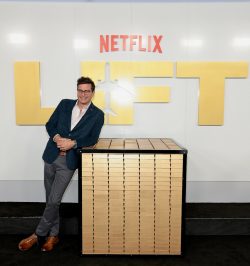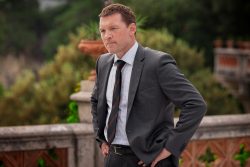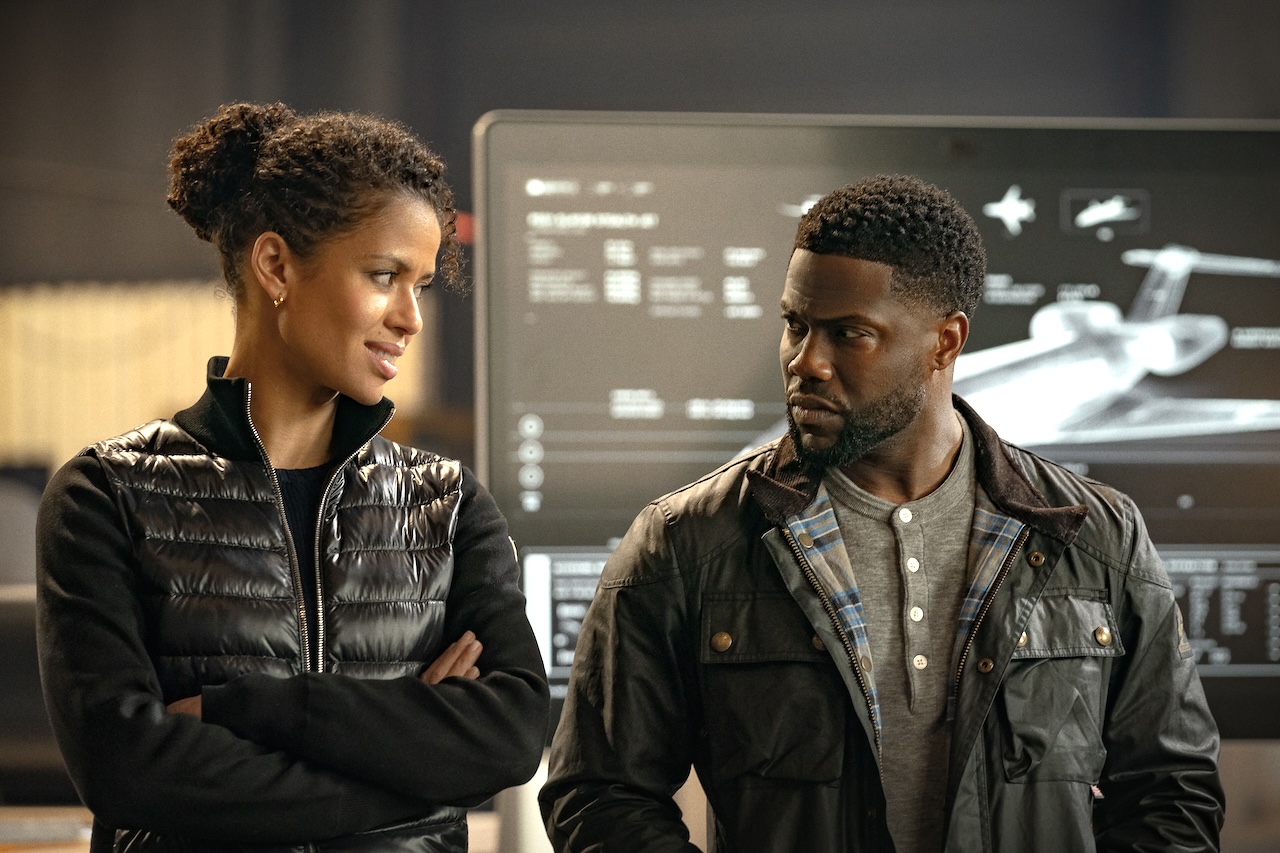“Lift means a lot of different things to me,” states screenwriter Daniel Kunka (12 Rounds) of his heist movie starring Kevin Hart as Cyrus, Gugu Mbatha-Raw as Abby, and Sam Worthington as Huxley. “The first thing that I was attracted to was challenge of trying to steal gold from a plane mid-air.” This is an easy premise for audience to grasp. The next logical followup question would be, “How do they do it?” Now you have an action movie with forward momentum and a whole lot of fun.
“It becomes my entry into the post-Ocean’s 11 heightened action heist movie that we’ve also seen with the Fast And The Furious franchise. Some of those are great action, smart heist movies and Lift becomes my version of that,” he continues.
Kunka first began noodling the idea over a decade ago after reading an article on how commercial airliners were sometimes used to transport gold without the passengers knowing. Then Kunka’s imagination began to bubble, he asked how that gold could be stolen and his screenplay was born.
He tried pitching it around town, but, as a complicated, execution-dependent, big-budget heist movie without any attachments, it didn’t progress. But Daniel persisted. He keeps a log of film ideas that excite him and “Gold On A Plane” was always on it. “During the pandemic, I had just written a script that didn’t quite work and I was looking for a new idea. So, I went back and re-read the ‘gold on a plane script’, and I thought, ‘I think that people want to have fun with movies and want to have an extensive escapism.'” So, Kunka wrote Lift on spec without an industry interest.

Daniel Kunka. Photo by Dimitrios Kambouris/ Getty Images for Netflix
“We sent the script around on a Monday and Simon Kinberg and his executive, Audrey Chon, read it and immediately got it. They were dialled into the concept,” recalls Kunka. They rushed the script to Netflix who brought in Kevin Kart as a star vehicle for him to dip his acting toes in the high-flying action genre.
The screenwriter believes that the simplicity of the high concept was critical to jumping those barriers. “That’s what the marketing was. That was what the focus of the ads was.”
Structuring The Heist By Page Numbers
Since Daniel Kunka wrote Lift on spec, he had to consider all the rules and twists and turns of the story to keep the audience hooked and entertained, but never confused. Kunka used his page count as a guide for timing his action sequences.
“When I lay out a new idea, I like to think in benchmarks by pages. I always know that you have a first act where a story is all going to get started. And then, somewhere between page 25 and 30 we’re going to have a first act break where someone is going to make a decision that is going to set off the rest of the movie. That was Cyrus accepting the job to steal this gold.”
“I am also going to introduce the characters in an opening heist sequence. We are going to present this problem. But by page 28, hopefully, or page 30, Cyrus is going to say, ‘We are going on this heist.’”
The next stage of the process, the first fifteen pages of the second act, involves laying out the challenges for the team. They each have a role to play. Denton (Vincent D’Onofrio) is a master of disguise, Camila (Úrsula Corberó a) has to fly the plane, Mi-Sun (Kim Yoon-ji) is a hacker, Magnus (Billy Magnussen) is a safecracker, and Luke (Viveik Kalra ) is an engineer. Then you lay down obstacles so the heist isn’t easy for them. “I think it is really important to keep pressure on the team from the outside.” This brought the page count up to page 45 and introduced outside forces like Interpol and banker and terrorist Jorgensen (Jean Reno) and his henchmen who want the gold for themselves.

Mi-Sun (Sun Jee Kim) & Camila (Úrsula Corberó) Photo by Christopher Barr/ Netflix
“If we have to be on the plane by page 60, and we laid out all these things, then from page 45 to 60, we are going to solve some of those smaller tasks so that everyone can get ready to go. It becomes an economy of ideas that is of driven by the structure.”
“I knew by page 90 things were going to go wrong on the plane and the plane was going to go into the small runway in the Alps. Then our third act was going to wrap everything up. It was really about finding character moments for each of them then weaving those together .”
“Things are always moving from pages 30 to 45 to 60 when we get on the plane. Things go well, then things go bad at page 75. We have to bring the plane down and then we get into the finale.”
Character Building
When Daniel Kunka first conceived Lift, he wrote Abby as a female lead character. She later shared the spotlight with Cyrus.
In the final version, Abby, Interpol agent and former Cyrus flame are forced to work together in order to capture Jorgensen. Tension and drama were always present for the characters even before the plane had left the runway.
“We sold a female lead to Netflix and that is what everyone was excited about. I was really excited the story we could tell. I didn’t want to tell another story about a thief and a cop falling in love, which was basically the first draft. I was really intrigued by this idea that they have already had their whirlwind romance. They are past it I thought it was really unique to follow that interaction afterwards.” Getting the couple back together after the heist, although not a great surprise, was an organic conclusion to the story.

Huxley (Sam Worthington) Photo by Stefano Cristiano Montesi/ Netflix
“When we switched Kevin and Gugu’s roles, it was always, ‘Kevin takes this mission, but has to have her there.’ He needs protection and needs to make sure that his team is safe so they don’t get double-crossed by Jorgensen’s mob.”
Abby was allowed into the team environment, but isn’t part of the team. She doesn’t fully know how Cyrus or his team work. That gave the script room for character development and also act as a conduit for the audience to track them. Kunka quotes a scene when the team’s working out a problem on a blackboard. Cyrus is not worried and Abby questions him about his apparent lack of concern. He’s clearly the mastermind of the heist and his team are only ironing out minor wrinkles. This plot level discussion reveals deeper layers of each character.
Abby has regrets about their short-lived romance while Cyrus seeks to win her over again. Lift is more than an unrequited love story. “I think it’s about overcoming expectations and overcoming obstacles. When Cyrus was younger, he never spoke up and he felt that he was smarter but wasn’t allowed to express himself,” adds Kunka. “This leads to this theme of artistry throughout the movie.”
This is our version of the art and we’re liberating the art from unworthy owners – Cyrus
“I feel like Cyrus has always had to constantly be proving himself in his world even though he’s been always wildly successful at stealing things. It’s thought of as just stealing things and not an artistic endeavor. I think that he really does believe that there’s an art to what he does.”
This ties in with his relationship with Abby where he doesn’t understand why they’re not together. “Why aren’t we doing this? I know I’m a thief, but I know you’re a cop. But clearly, our business week was amazing, and I have feelings for you. We can get past all of these things,” says Cyrus hopefully.
Abby isn’t eager to repeat an ill-fated romance. Social conventions dictate that thieves and Interpol agents shouldn’t become romantically involved. Cyrus challenges those conventions and expectations as he’s done his whole life. He’s always been told things can’t be done and often proves otherwise. He comes to the realization that he no longer needs to impress other people because he knows he’s good.
Lift prides itself on its outlandish and elaborate stunt sequences. Audiences call it “ludicrously entertaining.” Much of this is attributed to director F. Gary Gray who worked on action films like Fast And The Furious and Men In Black. Kunka focused on the machinations of the heist while Gray concentrated on being entertaining.
“Gary was really smart in coming in and saying, ‘No, we’re going to push this and we’re going to make this a more action-filled and less restrained ending. He found a sweet spot between being grounded and patently absurd.”
Final Thoughts
Daniel Kunka has written many scripts covering a range of genres. “My only two produced credits are action-oriented heist movies so it would be easy to say that I’m an action-oriented heist writer. That’s far from the truth. I’ve set up scripts about the war of 1812, about the water and food crisis presently happening, about the Pope during World War II, and a script about a family of wolves in Yellowstone Park during a zombie apocalypse.”
“I think every writer has to find what stories they’re intrigued by, that they’re excited by, and also what they bring to a story when it’s going to be ‘gold on a plane’? What voice are you bringing?”
Kunka continues that he’s most attracted to an underdog story. “Underdog stories about characters who are underestimated. I like stories where people are told they can’t do something and then they have to do it. I like stories where characters have to overcome both personal and interpersonal conflicts to reach great heights. They either don’t believe in themselves or have people don’t believe in them and put them in a scenario where they have to find a better version of themselves.”
He’s currently writing a television pilot about a team of professional cyclists who are the underdog team. Thinking about his story about the Pope during World War II, “It was this crazy impossible mission about this lawyer in Munich who helped the Pope and they authorized the assassination of Hitler. It’s this rag tag team coming together to try and get it done.”
